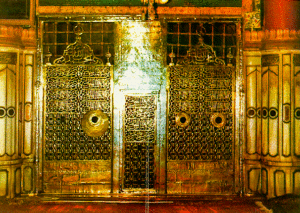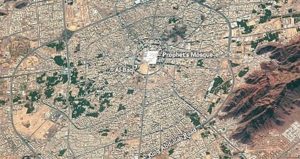Muslims venerate Muhammad* as God’s final and greatest prophet. According to tradition, Muhammad* was a 7th-century CE Arab trader of noble Meccan heritage, who began receiving revelations from God in midlife. Those revelations were eventually compiled in the Qur’an.
Muhammad* has been a controversial figure ever since he first proclaimed himself a prophet of God—Allah in Arabic. To this day, he remains as controversial as ever. Beginning in the 1970s, some Western scholars began radically rethinking Islam’s origins. And this has dramatically changed the way many view Muhammad.*
The problem is that there’s no longer just one Islamic origins story in circulation. And the existence of competing narratives of Islam’s founding supports conflicting versions of Islam.
The traditional narrative has been entirely set aside by some and given a major makeover by others. It’s important that we get the story of Islam’s founding right because it acts like a lens through which we view the Qur’an. Without clarity on Muhammad’s prophetic career, we read the Muslim scripture through a blurred lens, yielding a muddied understanding of both the Qur’an and Islam. And all this raises the question of which version the historical data best support.
The traditional Islamic origins narrative is now handled in four very different ways. To be faithful to the evidence we have for Muhammad,* we must briefly consider each in turn:
- Embrace the traditional origins narrative in full—e.g., Ibn Hisham’s sira (biography)—as traditional Muslims do
- Dispute the traditional origins narrative entirely or substantively, as a revisionist
- Put our own spin on the traditional narrative, as a reformist, including in our version only those bits of the traditional narrative we like
- Accept the traditional origins narrative, but only in broad outline and demythologized, as a critical realist

Full acceptance of the traditional narrative is natural for most Muslims because their traditional cultures demand acceptance of tradition, no major challenges permitted. Also, the traditional narrative supports Muslim belief in Muhammad’s supremacy, perfection and finality. However, the traditional biography mythologizes Muhammad* by presenting miracle proofs of his prophethood. This is contrary to the Qur’an, which repeatedly says his only miracle was the Qur’an itself.[1]
Western revisionists dispute the authenticity of Muhammad’s biography due to its late date, some 200 years after the fact.[2] However, they mistakenly demand a written biography of an oral culture like Muhammad’s and take the absence of written evidence as contrary evidence. But as every amateur detective knows, an absence of evidence disproves nothing. (It means only that you can’t yet prove your point.) This approach also erroneously dismisses oral tradition as worthless. But while oral cultures typically mythologize religious founders, they generally preserve their sacred traditions with great care.[3]
One problem with revisionism is that it effectively puts almost all our knowledge of Muhammad* up for grabs and turns the study of Islamic origins into a theoretical free-for-all.

Though most revisionists now acknowledge Muhammad’s historicity, many view him as a Christian or quasi-Christian who began outside of Arabia. This leads them to believe his primary concerns were Christian theological controversies and to read them into the Qur’an. The evidence, however, doesn’t support their hypotheses. And as noted earlier, this sort of misunderstanding seriously limits one’s grasp of the Qur’an.
Revisionism’s speculative free-for-all unintentionally lends credibility to the third approach, the à la carte approach of Karen Armstrong and other reformists, non-Muslim and Muslim.[4] Most reformists do a major makeover on Muhammad,* including only those bits of sira they like and repackaging it all for Western consumption. For many, this means marketing him as a Gandhi-like advocate of nonviolence and human rights. They also present their version as if it’s the traditional one, while in fact their own values function as the arbiter deciding what Muhammad* was like and how to interpret the Qur’an. They doubtless justify this self-centeredness in terms of the good they hope it will do. But from a historian’s perspective, it is narcissistic nonetheless.

The final approach, of critical realism, is the one most consistent with the evidence. It accepts the traditional biography, but without its miraculous elements and only in broad outline. Muslims have always known that the hadith, or traditions, behind Muhammad’s biography disagree in their details. Among other things, this led traditionists to develop a method of assessing which hadith were reliable. From a Western perspective, their method proves neither a tradition’s authenticity nor whether its details are correct. However, the hadith do agree on many points.
Since the hadith consistently agree on the broad contours of Muhammad’s prophetic career, we have every reason to accept the traditional story to that degree.
One thing confirming the reliability of this narrative is the fact that the chronology of the Qur’an based on it generally fits both the Qur’an’s style and contents. Also, the early extra-qur’anic evidence generally confirms the traditional narrative and no evidence contradicts it. Based on early extra-qur’anic evidence, the Qur’an and the hadith, then, we can accept the following about Muhammad:*
- He was an Arab, born in pagan Mecca around 570 CE.
- Orphaned by the death of his parents at an early age, he was raised by one of his uncles.
- As a young man, he worked as a trader, likely traveling between Syria and Yemen.
- At age 25, he married his wealthy employer, the widow Khadija.
- When he was about 40, he claimed the God of the Bible had sent him to warn the Meccans of God’s judgment if they didn’t renounce their idolatry and immorality.
- He said his messages, now compiled in the Qur’an, came to him verbatim from God and that his prophethood had been predicted by Jesus.
- In refusing to submit to him, the Meccans rejected not just his monotheism, but also his bid to become their theocratic ruler.
- After years of preaching this message, the Meccans persecuted him and his followers.
- At this point the Muslims were greatly outnumbered, and Muhammad* took a conciliatory and nonviolent approach.
- When Khadija died, he embraced polygyny, cohabiting with his favorite wife Aisha when she was nine, a culturally acceptable practice then.
- Muhammad* visited the nearby town of Ta’if, but they also refused to make him their theocratic ruler.
- In 622 he emigrated to Yathrib, later called Medina, where he founded his theocracy.
- He soon after launched a military campaign to force the Meccans to submit.
- He and his followers took those victories where they were greatly outnumbered in battle (e.g., at Badr) as proof that God was with them.
- Judging Medina’s Jews to be treacherous, he dealt harshly with them, but he showed clemency to most of his Meccan enemies upon their surrender.
- Following their surrender, he cleansed its Kaaba of its idols and turned it into the focal point of Muslim worship.
- Buoyed by his victory over the Meccans, he initiated Islam’s conquest of the rest of Arabia.
- He then became more combative toward Jews and Christians, labeling both groups polytheistic.
- Under his rule, he permitted Jewish and Christian tribes to keep their religion, but as dhimmis, protected 2nd-class citizens.[5]
- In 632 Muhammad* died and was buried in Medina.

Although such things as the dates of his birth and death are disputed, this much of Muhammad’s traditional biography is generally compatible with our sources on early Islam. Hence, it’s reasonable for us to accept it.[6]
While a weak or skewed understanding of Muhammad* gives us a faulty grasp of the Qur’an, that in itself is no reason to choose one narrative over another. However, it does underscore the importance of choosing well here. And our choice of origins narrative determines our understanding not just of the Qur’an, but also of Islam generally.
* Peace be upon his descendants
[1] For example, the sira says Muhammad* literally split the moon in two. By contrast, in the Qur’an, God responds to the pagans’ repeated requests for a miracle proof by saying that he will give them nothing beyond the miracle of the Qur’an (e.g., Q 2:118, 145).
[2] Logically, the absence of early “watertight” evidence for Muhammad* leads some Western scholars to question his very existence.
[3] Some scholars foolishly liken oral tradition in oral cultures to our kids’ game of “telephone,” in which the essence of the game is garbling the message heard.
[4] It does this by making Muhammad’s context, character and vision so very pliable that nearly any reformist’s take on him is possible.
[5] In Muhammad’s day, it was normal for governments to relegate to society’s margins any groups not fully subscribing to the ruler’s vision.
[6] Though not mentioned by traditional biographies, my point about Muhammad’s wanting to become Mecca’s theocratic ruler is implicit in them.




Leave a Reply